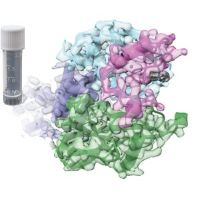Specification
| Description | Recombinant protein from the full-length sequence of homo sapiens FYN proto-oncogene, Src family tyrosine kinase (FYN), transcript variant 1 (NM_002037). |
| Organism | Homo sapiens (Human) |
| Expression Host | Human Cells |
| Tag Info | His or DYKDDDDK. Please contact us if you need further information or require specific designed tag. |
| Purity | Greater than 90% by SDS-PAGE gel |
| Uniprot ID | P06241 |
| Entry Name | FYN_HUMAN |
| Gene Names | FYN |
| Alternative Gene Names | |
| Alternative Protein Names | Tyrosine-protein kinase Fyn (EC 2.7.10.2) (Proto-oncogene Syn) (Proto-oncogene c-Fyn) (Src-like kinase) (SLK) (p59-Fyn) |
| Application | Antigens, Western, ELISA and other in vitro binding or in vivo functional assays, and protein-protein interaction studies; For research & development use only! |
| Buffer | Purified protein formulated in a sterile solution of PBS buffer, pH7.2, without any preservatives |
| Endotoxin | Endotoxin level is < 0.1 ng/µg of protein (<1EU /µg) |
| Length | 537 |
| Molecular Weight(Da) | 60762 |
| Protein Sequence | (The sequence of expressed protein may have some variation from the sequence shown below. Please contact us for the exact sequence.) MGCVQCKDKEATKLTEERDGSLNQSSGYRYGTDPTPQHYPSFGVTSIPNYNNFHAAGGQGLTVFGGVNSSSHTGTLRTRGGTGVTLFVALYDYEARTEDDLSFHKGEKFQILNSSEGDWWEARSLTTGETGYIPSNYVAPVDSIQAEEWYFGKLGRKDAERQLLSFGNPRGTFLIRESETTKGAYSLSIRDWDDMKGDHVKHYKIRKLDNGGYYITTRAQFETLQQLVQHYSERAAGLCCRLVVPCHKGMPRLTDLSVKTKDVWEIPRESLQLIKRLGNGQFGEVWMGTWNGNTKVAIKTLKPGTMSPESFLEEAQIMKKLKHDKLVQLYAVVSEEPIYIVTEYMNKGSLLDFLKDGEGRALKLPNLVDMAAQVAAGMAYIERMNYIHRDLRSANILVGNGLICKIADFGLARLIEDNEYTARQGAKFPIKWTAPEAALYGRFTIKSDVWSFGILLTELVTKGRVPYPGMNNREVLEQVERGYRMPCPQDCPISLHELMIHCWKKDPEERPTFEYLQSFLEDYFTATEPQYQPGENL |
Background
| Function | FUNCTION: Non-receptor tyrosine-protein kinase that plays a role in many biological processes including regulation of cell growth and survival, cell adhesion, integrin-mediated signaling, cytoskeletal remodeling, cell motility, immune response and axon guidance. Inactive FYN is phosphorylated on its C-terminal tail within the catalytic domain. Following activation by PKA, the protein subsequently associates with PTK2/FAK1, allowing PTK2/FAK1 phosphorylation, activation and targeting to focal adhesions. Involved in the regulation of cell adhesion and motility through phosphorylation of CTNNB1 (beta-catenin) and CTNND1 (delta-catenin). Regulates cytoskeletal remodeling by phosphorylating several proteins including the actin regulator WAS and the microtubule-associated proteins MAP2 and MAPT. Promotes cell survival by phosphorylating AGAP2/PIKE-A and preventing its apoptotic cleavage. Participates in signal transduction pathways that regulate the integrity of the glomerular slit diaphragm (an essential part of the glomerular filter of the kidney) by phosphorylating several slit diaphragm components including NPHS1, KIRREL1 and TRPC6. Plays a role in neural processes by phosphorylating DPYSL2, a multifunctional adapter protein within the central nervous system, ARHGAP32, a regulator for Rho family GTPases implicated in various neural functions, and SNCA, a small pre-synaptic protein. Participates in the downstream signaling pathways that lead to T-cell differentiation and proliferation following T-cell receptor (TCR) stimulation. Phosphorylates PTK2B/PYK2 in response to T-cell receptor activation. Also participates in negative feedback regulation of TCR signaling through phosphorylation of PAG1, thereby promoting interaction between PAG1 and CSK and recruitment of CSK to lipid rafts. CSK maintains LCK and FYN in an inactive form. Promotes CD28-induced phosphorylation of VAV1. In mast cells, phosphorylates CLNK after activation of immunoglobulin epsilon receptor signaling (By similarity). {ECO:0000250|UniProtKB:P39688, ECO:0000269|PubMed:11005864, ECO:0000269|PubMed:11162638, ECO:0000269|PubMed:11536198, ECO:0000269|PubMed:12788081, ECO:0000269|PubMed:14707117, ECO:0000269|PubMed:14761972, ECO:0000269|PubMed:15536091, ECO:0000269|PubMed:15557120, ECO:0000269|PubMed:16387660, ECO:0000269|PubMed:16841086, ECO:0000269|PubMed:17194753, ECO:0000269|PubMed:18056706, ECO:0000269|PubMed:18258597, ECO:0000269|PubMed:19179337, ECO:0000269|PubMed:19652227, ECO:0000269|PubMed:20028775, ECO:0000269|PubMed:20100835, ECO:0000269|PubMed:22080863, ECO:0000269|PubMed:7568038, ECO:0000269|PubMed:7822789}. |
| Pathway | |
| Protein Families | Protein kinase superfamily, Tyr protein kinase family, SRC subfamily |
| Tissue Specificity | Isoform 1 is highly expressed in the brain. Isoform 2 is expressed in cells of hemopoietic lineages, especially T-lymphocytes. {ECO:0000269|PubMed:10196263}. |
QC Data
| Note | Please contact us for QC Data |
| Product Image (Reference Only) |  |

